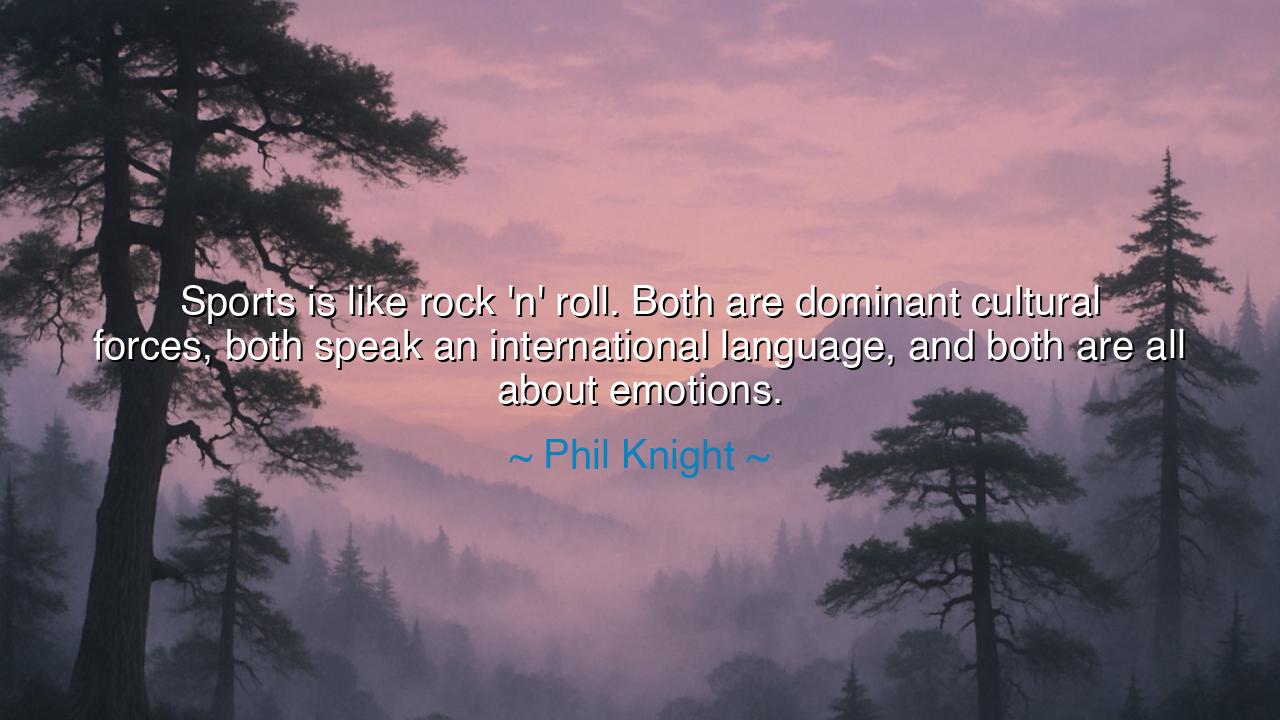
Sports is like rock 'n' roll. Both are dominant cultural forces
Sports is like rock 'n' roll. Both are dominant cultural forces, both speak an international language, and both are all about emotions.






Hear the words of Phil Knight, a visionary who bridged sport and commerce, who declared: “Sports is like rock ’n’ roll. Both are dominant cultural forces, both speak an international language, and both are all about emotions.” At first, his words may seem as mere poetry, comparing games to music. Yet look deeper, and you will see that he speaks of two mighty rivers of human expression—sports and rock ’n’ roll—that carry within them the shared heartbeat of entire generations. They are more than pastime or entertainment: they are languages of the soul, uniting strangers across borders, cultures, and tongues.
The meaning of this saying is profound. Sports and music both transcend the ordinary speech of men. A goal scored in the final minute, a soaring guitar riff breaking the silence of a stadium—both bring forth cries, tears, laughter, and the ecstasy of shared emotion. In these moments, the barriers of nation, race, and creed fall away, and all hearts beat as one. Knight reminds us that these forces are not confined to courts or concert halls, but shape identity, community, and history itself. They are dominant cultural forces, shaping the very way societies see themselves.
The origin of this truth lies deep in the human story. In ancient days, the Greeks gathered for the Olympic Games, where competition honored the gods and bound city-states together, even amidst war. In every land, tribes raised songs and drums to summon courage, to grieve, or to rejoice. Both athletics and music have always been international languages, spoken not with words but with rhythm, movement, and passion. Knight, by comparing sports to rock ’n’ roll, brings an ancient truth into modern garments: the spirit of man is stirred most deeply by rhythm and contest, harmony and struggle.
Consider the story of Nelson Mandela at the 1995 Rugby World Cup. South Africa, fractured by the scars of apartheid, was a nation on the brink of division. Yet when Mandela donned the jersey of the Springboks and stood before the stadium, uniting black and white under the banner of sport, the crowd roared as one. Rugby became not just a game, but a song—a harmony of unity. In that moment, sports spoke louder than politics, as rock ’n’ roll once did in uniting youth across continents. It was all about emotion, and emotion healed what reason could not.
The lesson is this: never dismiss the power of shared passion. Whether through music or sports, humanity finds a language that cannot be silenced. These forces remind us that while reason divides with arguments, emotion unites with experience. To cheer together, to sing together, to weep together—these are the moments when humanity remembers it is one family. In this way, both the athlete and the musician are priests of a universal temple, guiding the people into communion with one another.
Practical action must follow. If you are an athlete, play not only for victory, but for the hearts of those who watch. If you are a musician, sing not only for skill, but for the shared pulse of the people. And if you are neither, then open yourself to these experiences: attend games, attend concerts, not as a consumer but as a participant in a greater ritual of community. Allow yourself to be moved, to cry, to sing, to shout—for these are not weaknesses, but the essence of being human.
And so, child of tomorrow, remember Knight’s wisdom. Sports and rock ’n’ roll are not distractions from life, but mirrors of life itself. They remind us that we are creatures of passion, not machines of calculation. They remind us that across borders and barriers, we share the same rhythm in our hearts. Embrace them as sacred fires—celebrate, sing, strive, and play—for in these universal languages lies the power to unite the world.






AAdministratorAdministrator
Welcome, honored guests. Please leave a comment, we will respond soon